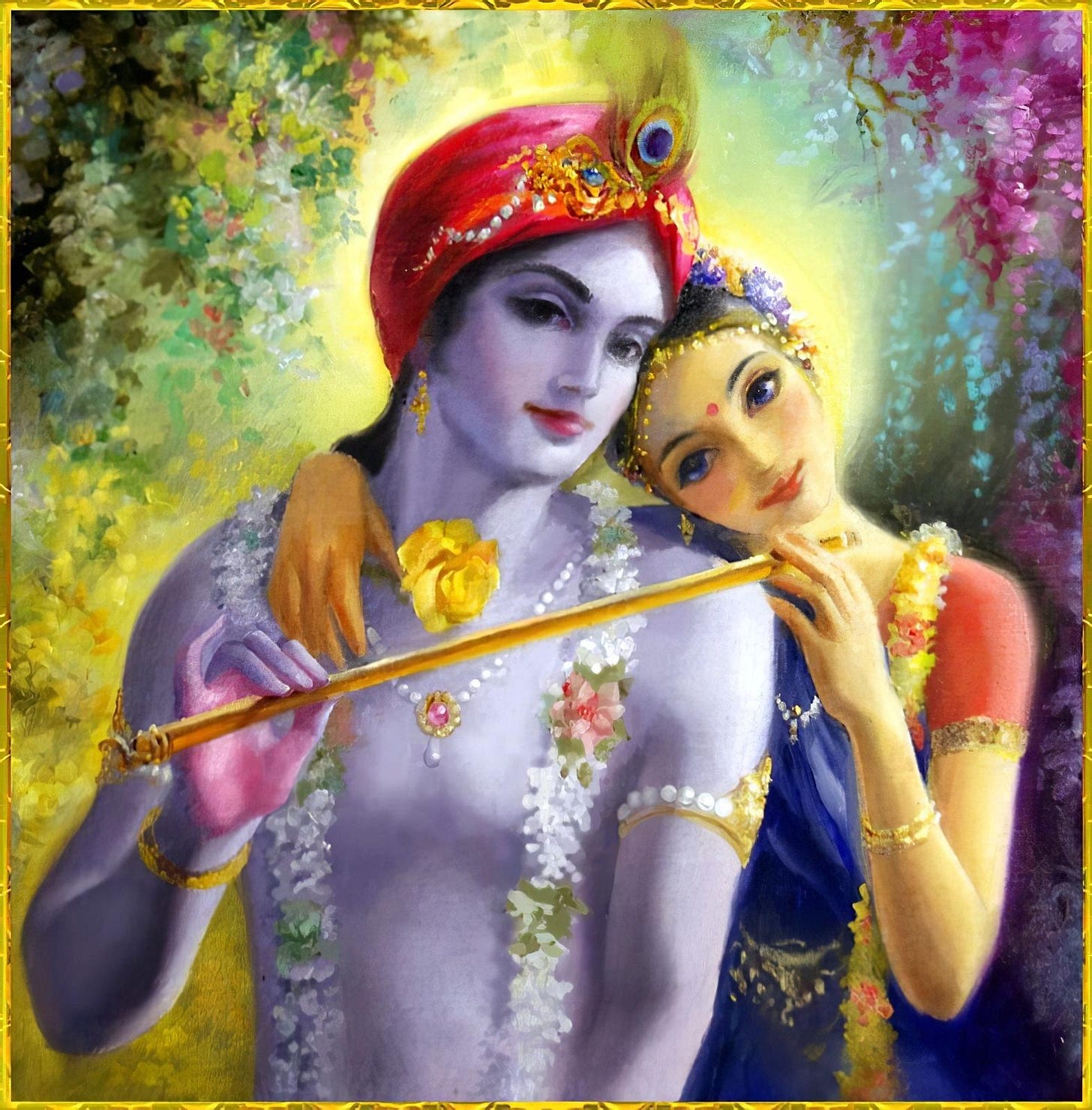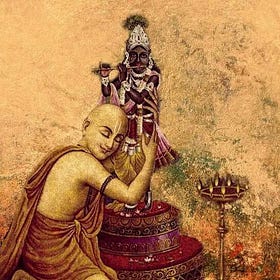The true goal of the Vedas
The whole purpose of material creation is to give a chance to the conditioned souls to revive their eternal nature. The Vedas describe other topics, but they gradually bring to this ultimate goal.
The whole purpose of material creation is to give a chance to the conditioned souls to revive their eternal nature. The Puranas explain that there are 8,400,000 forms of life in this universe, distributed amongst aquatics, plants, insects, lower animals, humans, and also higher beings, all the way up to Brahma. Before attaining the human form, the soul has to pass through an extremely long evolutionary process, going through millions of different forms of plants and animals.
In all the lower species of life, the soul is fully immersed in the bodily conception of life, and thus works tirelessly just to maintain it. Only in the human form of life, there is the possibility of understanding our real nature as spiritual sparks transcendental to the body, starting the process of inquiry into the absolute truth.
This understanding of our transcendental nature has two components. The first component is to understand our nature as spiritual beings, transcendental to the body. The second is to understand the Supreme Personality of Godhead.
However, even when we come to the point of trying to understand the absolute truth, there are many traps. The Vedas are like a desire tree containing all types of knowledge. Because most are interested only in the four materialistic religious principles of dharma, artha, kama, and mokṣa (mundane religiosity, economic development, material sense gratification, and impersonal liberation), the Vedas extensively explain how to achieve these goals in the karma-kanda section. For spiritually inclined people, there is the jñana-kanda section, which deals with spiritual knowledge, such as the Upaniṣads and the Vedānta-sūtra. This search for transcendental knowledge culminates in the Śrīmad-Bhāgavatam, which brings the highest knowledge, directly describing the Supreme Personality of Godhead. In this way, the Śrīmad-Bhāgavatam is considered the essence or the ripened fruit of all Vedic literature.
However, not all followers of the Vedas understand that self-realization is the goal of human life. Many think that the performance of material duties and auspicious activities mentioned in the karma-kanda section of the Vedas, with the purpose of elevation to the celestial planets, is the ultimate goal of the Vedas. During their studies, however, they inevitably come across passages that describe something higher, describing a source of ultimate happiness, beyond the actions and reactions of this material world. Take these two passages for example:
yo vai bhūma tat sukham, nānyat sukham asti
bhūmaiva sukham, bhūmatveva vijijñāsitavyaḥ"Bhūma, the infinite and absolute Personality of Godhead, is the source of true happiness. No genuine bliss is found on what is limited and temporary. He alone is the source of bliss and He alone should be inquired to and realized in truth." (Chāndogya Upaniṣad 7.23.1)
ātmā vā are draṣṭavyaḥ śrotavyo
mantavyo nididhyāsitavyo maitreyi"O Maitreyī, indeed, the Lord (ātmā) should be perceived, heard, inquired about, and meditated upon." (Bṛhadāraṇyaka Upaniṣad 2.4.5)
Why is that the Supreme Lord, the Supreme ātmā, should be investigated, heard, contemplated, and meditated upon? Because knowing the Lord is the only path to immortality, to reestablishing our original nature as pure souls in our original relationship with the Lord. Even impersonal liberation doesn't include this goal, since one becomes free from material conditioning, but does not revive one's relationship with the Lord.
The Upaniṣads contain many other philosophical passages included by Vyāsadeva to precisely inspire people lost on the path of fruitive activity to start the process of inquiring about the absolute truth, just as lighthouses guiding lost ships to safety.
However, there are also passages in the scriptures that appear to contradict this view, suggesting that fruitive activities and the performance of vows can bring one permanent benefit.
The Ṛg-Veda, for example, appears to discuss the worship of multiple deities, including Indra, Agni, the Aśvins, Maruts, and Adityas, Varuṇa, Soma, etc. Viṣnu is mentioned as the upholder of the cosmic order, but his position as the Supreme Lord is not directly emphasized. In the 8th Mandala of the Ṛg-Veda, Sūkta 18, for example, we find glorification of Soma, including promises of immortality by drinking the soma juice (or soma-rasa):
apama somam amrta abhuma
"We have attained immortality by drinking the soma juice." (Rg Veda 8.18.3)
This passage includes other verses of glorification to Soma, but as summarized in this passage, the main message of the passage is that one can obtain immortality by worshiping demigods.
Similarly, the Yajurveda describes:
aksayyam ha vai caturmasyajinah sukrtam bhavati
"Indeed, the merits of one who performs the vow of cāturmāsya are inexhaustible."
Based on passages like these, one could argue that by simply discharging ordinary pious duties described in the dharma-sastras, one can attain immortality and permanent rewards. Thus, one could conclude that material dharma is everything, and there is no necessity to inquire about Brahman.
To this argument, Vyāsadeva answers, in the Vedānta-sūtra: athāto brahma-jijñāsā. After having come to human life and attained the opportunity of associating with saintly persons, one should enquire about Brahman. The absolute truth is the only source of true, eternal happiness.
In this sutra, the word "atha" means "now", and "atah" means "therefore". Atha atah (athāto) indicates the sequence after a cause. In other words, athāto means "therefore, after this"; after coming to a certain point or attaining a certain position, it comes the time to inquire about Brahman.
These words indicate something higher than the mere execution of pious material duties described in the Vedas. After studying the Vedas, following the Varṇāśrama system, observing vows, etc., one eventually comes into the association of self-realized persons. Through their association, one comes to understand that pious material activities recommended in the Vedas as a way to satisfy material desires give only temporary results, and that only the Supreme Brahman brings eternal knowledge that awakens eternal spiritual bliss within oneself. The absolute truth is the Supreme Personality of Godhead, who is full of eternity, transcendental knowledge, unlimited spiritual bliss, and transcendental attributes.
In Raja-Vidya (ch.7), Prabhupada also explains these words, going in the direction that a person who is intelligent and comes to realize the shortcomings of materialistic life can start inquiring about the transcendental by approaching a spiritual master: "The beginning injunction of the Vedānta-sūtra is athāto brahma-jijñāsā: “Now is the time to inquire about Brahman.” The word atha means that one who is intelligent, who has come to the point of realizing the basic frustrations of material life, is capable of making inquiry. In Śrīmad-Bhāgavatam it is stated that one should inquire from a spiritual master about subjects that are “beyond this darkness.” This material world is by nature dark, and it is artificially lighted by fire. Our inquiries should be about the transcendental worlds, which lie beyond this universe."
Understanding that all forms of material happiness are limited and temporary, and that true and eternal happiness exists only in the absolute truth, one rejects the sections of the Vedas that speak about pious fruitive activities and starts to inquire about spiritual topics.
Read also:
How dharma can sometimes be an impediment to love of Godhead
In the Caitanya Caritāmṛta, ādi-lila 7.84, it is mentioned that "'Religiosity, economic development, sense gratification and liberation are known as the four goals of life, but before love of Godhead, the fifth and highest goal, these appear as insignificant as straw in the street.'"
If you read this article to the end, give it a like. This makes Substack recommend it to more people.




Hare Krishna Prabhu ji 🙏 englihtening article. It also remind me the verse of Bhagavad Gita where Krishna said to Arjuna that karma kanda section of Vedas are like flowery words with thorn. Thank you prabhu for reminding that purpose of Vedas is to know Krishna. 🙇